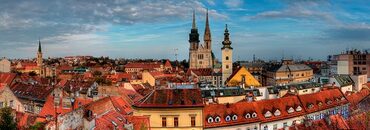and Balkan Europe
by IECOB & AIS Università di Bologna

Call for papers - Europe Unfinished: EU and the W/Restern Balkans in a Time of Crisis
Editors: Nebojša Blanuša and Zlatan Krajina (Faculty of Political Science, University of Zagreb).
Deadline for submitting abstracts: May 1, 2014
Deadline for submitting full papers: December 1, 2014

- Zagreb
Description
The book explores the political, cultural and communicational aspects of EU’s enlargement towards the East, in the context of the recent entry of its new member state Croatia, and many others in the Balkans, waiting in the wings.
At a time when crisis, in various forms, has taken the status of permanence, and when trans- and intra-European migration has come to serve the elites as an occasion to question the future of multiculturalism, new candidates, mainly in the Balkans, offer a rather different vision of the unified Europe. For the ex-Yugoslav countries in particular (Europe’s old ‘inner others’ in the Balkans), the EU serves as a desired escape from the burdens of the peninsula traditionally connoted as ‘troubled’ (lawless and undemocratic) into what is perceived as an ordered and prosperous Central and Western Europe. ‘European-ness’ has become a token of exchange in a symbolic economy of accession as much as a flexible geographical appellation. Following the bloody dissolution of Yugoslavia, and a rocky transitional justice and democratisation, Croatia’s effort (2003-2013) to ‘exit’ the Balkans’ and ‘enter’ ‘Europe’ has been marked by the EU’s endeavour to ‘train’ the Balkan newcomer, and attain, in return, a rare but much needed expression of optimism about the prospects of the EU project itself.
In 2013, Croatia was the first Western Balkan country to enter after Slovenia in 2004, and Serbia has recently started the accession negotiations. We ask whether these developments constitute a transformation of the Balkans as they have been known (into Southeastern Europe? Western and Eastern ‘balkanised’ Balkans?), what does the entry of one country from the region into the EU means for others (tougher criteria?, optimism?), and what has made the EU Croatians’, Serbians’, Bosnians’, Montenegrins’, Kosovar’s, Macedonians’, and Turks’ preferred home for the future? By extension, how has Euro-optimism taken shape in Ukraine? Furthermore, if the EU (a political union) is routinely equated with Europe (the continent), and European-ness is given powerful, if changing, semantic charge (a trope of modernity, progress, and boundary maintenance), what is the role of media in the constitution of the EU as a ‘space of identity’ (as coined by David Morley and Kevin Robins)? In the context of the latest, Croatian accession, and the recent start of negotiations with Serbia, does the recursive stretching of the EU’s borders change or reproduce the traditional West/East divide and its politics of borders?
Eligible topics
Authors are invited to submit papers dealing with but not restricted to the following key issues:
- The complex relationship between Europe, the EU and its various inner and outer Others, as political entities, historical trajectories, geographical locations, social and cultural phenomena and practices, in the context of the accession processes in the Western and ‘Restern’ Balkans
- The interplay of media representations of Europe and its various (Oriental or Balkan) Others; policies and institutional incentives for the creation of inter-European ‘mediaspheres’; and the everyday practices of European citizens and migrants concerning their belonging within, across and beside the EU
- The institutional and cultural transformations involved in any of the EU’s waves of enlargements – in relation to the gradual inclusion of the Balkans into the EU
Successful proposals are expected to adopt:
- A critical perspective, assuming that what is analysed articulates certain power relations between the EU’s institutions, states, regions, political elites, media and ordinary people
- A multidimensional perspective, whereby Europe exists at once as an idea, a continent, a system of representation, a system of legislation and economy, and a lived reality
- A methodological and intellectual flexibility, in transgressing disciplinary boundaries, and innovative (unconventional) approaches to research and presentation of argument
Papers can be based on empirical research or on a theoretical discussion addressing any of the above issues. We welcome both conventional scholarly papers and creative presentations involving visual methods; unusual approaches and interdisciplinary ventures (politics, political economy, media and cultural studies, human geography, history); and contributions from authors not necessarily affiliated with academic institutions.
Guidelines for submission
Deadline for abstracts (400-500 words) is 1 May 2014. Abstracts and short author bios should be sent to nblanusa@fpzg.hr and zkrajina@fpzg.hr . Successful submissions will be notified by 1 June 2014. Deadline for full paper (up to 6000 words, including references) submission will be 1 December 2014.
Organizer
- Nebojša Blanuša and Zlatan Krajina
- Faculty of Political Science, University of Zagreb
Information & contacts
Nebojša Blanuša and Zlatan Krajina
e-mail: nblanusa@fpzg.hr and zkrajina@fpzg.hr
PECOB: Portal on Central Eastern and Balkan Europe - University of Bologna - 1, S. Giovanni Bosco - Faenza - Italy
Chiudi la versione stampabile della pagina e ritorna al sito.